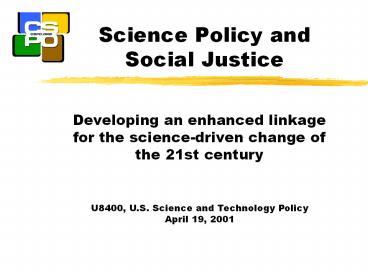Science%20Policy%20and%20Social%20Justice - PowerPoint PPT Presentation
Title:
Science%20Policy%20and%20Social%20Justice
Description:
Man's power to achieve good or to inflict evil surpasses the brightest hopes and ... Henry Wallace. Vision. 1950s. Kilgore. Vision. 1990s. George Brown ... – PowerPoint PPT presentation
Number of Views:63
Avg rating:3.0/5.0
Title: Science%20Policy%20and%20Social%20Justice
1
Science Policy and Social Justice
- Developing an enhanced linkage for the
science-driven change of the 21st century
U8400, U.S. Science and Technology Policy April
19, 2001
2
Science is a Principal Driver of Change
Social change Internet
Economic change Science-based economy
National security change Weapons of mass
destruction
Environmental change Climate
3
President Dwight D. Eisenhower1953, First
Inaugural Address
- Mans power to achieve good or to inflict evil
surpasses the brightest hopes and the sharpest
fears of all ages. We can turn rivers in their
courses, level mountains to the plains. Oceans
and land and sky are avenues for our colossal
commerce. Disease diminishes and life lengthens.
Yet the promise of this life is imperiled by the
very genius that has made it possible. Nations
amass wealth. Labor sweats to create, and turns
out devices to level not only mountains but also
cities. Science seems ready to confer upon us,
as its final gift, the power to erase human life
from this planet.
4
Broad Impact of Outcomes
Evolutionary Steps in Science Policy
Limited Federal Policy
Strong Federal/ Collective Policy
1990s 1980s 1970s 1960s 1950s 1945 The Endless
Frontier
Aviation Industry Creation
1915 NCAC
Enhancing Agricultural Economy
1860s Morill Act
Stimulating Innovation in Communication
1830s Telegraph
Commerce Enhancement
1825 Coastal Survey
Exploration/ Military
1804 West Point
1803 Lewis Clark
Property Protection
1789 Constitutional Design
Narrow Impact of Outcomes
5
Broad Impact of Outcomes
Proposed or Theorized Concepts for Science
Policy
Science and Social Justice
1990s George Brown
Socialist Science
Equitable Science
Organizing the Nation, Again
1930s Henry Wallace Vision
1950s Kilgore Vision
1930s Dept. of Science
Limited Federal Policy
Strong Federal/ Collective Policy
Organizing the Nation
1880s Dept. of Science
1840s-60s Smithsonian Debate
1787 Constitutional Debate on National
University
Thinking Ahead, Looking Back
Science for the Nation
Narrow Impact of Outcomes
6
Science Policy is the Key Variable
We are being propelled into this new century
with no plan, no control, no brakes. Bill
Joy Co-founder and Chief Scientist, Sun
Microsystems
- Given the impact of science, science policy is
the critical variable and yet almost entirely
ignored.
7
1945 Policy Design Science the Endless Frontier
- Science as a public good
- Autonomy of scientists
- Importance of basic research
- Fundamental knowledge
- Performed without thought of practical ends
- Pacemaker of technical progress
8
Foundations of Science Policy
Republic of Science
Market Failure Model
Unpredictability
9
Possible Foundations of Science Policy
Democratic Science
Sociotechnical Outcomes Model
Prediction with Uncertainty
10
Focus on American Science Policy
- American science is the prototype
- Most basic research is funded by the U.S.
- In 2000, total RD expenditures in the United
States reached 233.0 billion. - U.S. RD investments continue to outdistance, by
more than 2to1, RD investments made in Japan,
the second largest RD-performing country. - The U.S. spent more money on RD activities in
1999 than any other country. The U.S. spent as
much by itself as the rest of the G-7
countriesCanada, France, Germany, Italy, Japan,
and the United Kingdomcombined.
11
Current Approach to Science Policy Internal Focus
INPUTS Processes Products Outcomes
- Input-driven process
- Addresses
- Conduct of ST
- Products and processes of ST
- Assumes
- All societal outcomes will be positive
- Linear model of innovation and societal benefit
12
Indications of Societal Transformation
- Genetically-modified organisms (GMOs)
- Development and distribution of AIDS drugs
- Nanotechnology
13
Genetically-Modified Organisms (GMOs)
- 30 years of plant genetics research
- Enabling transgenic plant design
- Empowering industry and the market
- Purpose of research
- Fundamental learning
- Productivity enhancement
- Social implications considerations
- None before 1999
14
AIDS Drugs
- Science program driven by alliance between
fundamental scientists and US interest groups - Origin of virus remains unaddressed
- Global nature remains unaddressed
- Research program molecular in nature
- Social implications considerations
- Limited to nation state basis
15
Nanotechnology (the future)
- Transformational technology (building at the
scale of nature) - Economics-driven
- Replacing integrated circuit technology base
- Social implications may be considered but how?
- Lack of tools
- Lack of teams
16
Health Indicators
Health Attainment, 1999 Health Expenditures
(Disability-adjusted life expectancy) as
of GDP 1. Japan (74.5) 7.1 3.
France (73.1) 9.8 4. Sweden (73.0)
9.2 12. Canada (72.0) 8.6 14.
U.K. (71.7) 5.8 22. Germany (70.4)
10.5 24. U.S. (70.0) 13.7 96. Iran
(60.5) 4.4 134. India (53.2) 5.2
Source WHO, The World Health Report 2000
17
Health vs. Wealth
Source WHO, The World Health Report 2000
18
Cycle Dynamics
Education
New skills
Societal Outcomes
Economic Outcomes
New social structures
POLICY
New industries
New institutions
ST Outcomes
Conduct of Science
Tech transfer
Knowledge Networks
Knowledge transfer
19
Need Outcome-Driven Science Policy Framework
- Increase quality and years of healthy life.
Eliminate health disparities. (US Health and
Human Services Dept) - Ensure a safe and affordable food supply. (US
Agriculture Dept) - Foster a reliable energy system that is
environmentally and economically sustainable. (US
Energy Dept) - Reduce the impacts of hazards caused by natural
processes and human actions. (US Interior Dept)
20
Science Policy Research Needs
- New science policy indicators
- New tools of evaluation
- New vision for what science can bring to our
future - Education of scientists and politicians
- Replace Bush paradigm as outmoded
21
Perspectives
- How does the science we decide to do affect the
distribution and equity of outcomes? - How do programs we implement affect the
distribution and equity of outcomes?
22
Morality and Science
- What is the collective good that we want inquiry
to promote? - Philip Kitcher, Professor of Philosophy
- in Science, Truth and Democracy, to be
published, 2001































